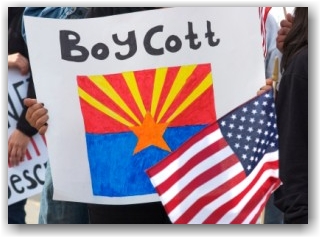Archive for the ‘Immigration Legislation’ Category
Tuesday, September 11th, 2012
By: Timothy Sutton, Communications Editor
 After two years of being deadlocked in the court system, the injunction preventing Arizona’s police force from enforcing the racially controversial “papers please,” program was lifted Wednesday by U.S. District Court Judge Susan Bolton. The decision is the latest legal move in Valle del Sol v. Whiting, a class action legal challenge to SB 1070 that was filed in May 2010. Plaintiffs include an Arizona-born citizen of Spanish and Chinese descent who was racially profiled. “While today’s ruling puts civil rights at risk, it does nothing to undermine our resolve to continue fighting until SB 1070 is struck down in its entirety,” said Chris Newman, legal director of the National Day Laborer Organizing Network. The Supreme Court upheld SB 1070 2(b), also known as the “papers please,” provision, earlier this summer. However, Justice Kennedy suggested there would be clear constitutional problems if the law were used to target racial or ethnic minorities, or to detain people for an unreasonable period of time while checking their immigration status. Opponents assert this unwanted outcome of targeting minorities is certain to transpire.
After two years of being deadlocked in the court system, the injunction preventing Arizona’s police force from enforcing the racially controversial “papers please,” program was lifted Wednesday by U.S. District Court Judge Susan Bolton. The decision is the latest legal move in Valle del Sol v. Whiting, a class action legal challenge to SB 1070 that was filed in May 2010. Plaintiffs include an Arizona-born citizen of Spanish and Chinese descent who was racially profiled. “While today’s ruling puts civil rights at risk, it does nothing to undermine our resolve to continue fighting until SB 1070 is struck down in its entirety,” said Chris Newman, legal director of the National Day Laborer Organizing Network. The Supreme Court upheld SB 1070 2(b), also known as the “papers please,” provision, earlier this summer. However, Justice Kennedy suggested there would be clear constitutional problems if the law were used to target racial or ethnic minorities, or to detain people for an unreasonable period of time while checking their immigration status. Opponents assert this unwanted outcome of targeting minorities is certain to transpire.
However, Governor Jan Brewer insists that the “papers please,” law does not allow Arizona law enforcement to conduct pretext stops because it requires reasonable suspicion. In a public statement she claimed Wednesday’s District Court ruling is “one big step closer to implementing the core provision of SB 1070.” That provision? Ridding Arizona of illegal immigrants.
Arizona’s highly controversial Maricopa County Sheriff Joe Arpaio was also been quoted on the Glenn Beck Show, clarifying his interpretation of reasonable suspicion, “If they have their speech, what they look like, if they look like they come from another country, we can take care of that situation.” As Brewer and Arpaio ramp up for the certain increase in detainment leading to deportation both Cecilia Wong of the ACLU and Victor Viramontes of MALDEF have committed to continue the fight against SB 1070.
It won’t be long before SB 1070 2(b) is back in the courthouse being challenged for racial profiling and discrimination based upon national origin. We will keep you updated on those and other immigration related breaking news as it develops. For more information, contact one of our immigration professionals at info@immigrationcompliancegroup.com or call 562 612.3996.
Tags: ACLU, Arizona Show me your Papers, Comprehensive Immigration Reform, Governor Jan Brewer, illegal immigrants, Immigration News, Immigration Reform, MALDEF, Papers Please, Racial Profiling, SB 1070, SHERIFF JOE ARPAIO, Undocumented Workers
Posted in Comprehensive Immigration Reform, Congress, DACA | DAPA, Immigration Legislation, Immigration News | Comments Off on Politics As Usual: Show Me Your Papers Survives AZ Court
Friday, September 7th, 2012
The Department of Homeland Security issued an update today that the Department of Homeland Security (DHS) is working to resolve this issue and will have a fix on September 14, 2012.
:::::::::::::::::::::::::::::
Without any advance notice, the CBP has made changes that affect the I-9 form by no longer issuing paper I-94 cards and no longer stamping I-20 forms for F and M student visas, or form DS-2019 Certificate of Eligibility for Exchange Visitors and Foreign Students, affecting both J and F visa holders.
Customs and Border Protection is in the process of automating traveler arrival records (I-94 cards) to streamline passenger processing. The current processing time for entering foreign visitors’ travel information into the I-94 database is 30 days or more. This does not affect the majority of foreign travelers visiting for business or leisure and will not affect any visitor’s record of departure. But it will greatly influence how you document Section 2 of the I-9 form for the nonimmigrant employee that produces a List A foreign passport with an I-94 entry card.
PLEASE NOTE: With the newly proposed 2-page I-9 form, no guidance has as yet been provided regarding the I-94 card as an acceptable List A document in concert with a foreign passport. We will keep you posted concerning these changes as soon as we receive new guidance. In the meantime, we recommend that you print out this information and attach it to any new employee’s I-9 form who would normally produce an I-94 record (but doesn’t have one and is waiting to access an electronic version) along with a foreign passport as a List A document.
CBP has suggested the following: Nomiggrants may need to prove their legal-visitor status within the first 30-45 days of their U.S. stay to:
Employers;
Motor vehicle registration or drivers’ licensing agencies;
The Social Security Administration;
U.S. Citizenship and Immigration Services; or
Universities and schools.
If during this timeframe, visitors need to provide evidence of legal status they should include the following:
Unexpired foreign passport; and
Country of Citizenship
CBP Arrival/Departure Record, Form I-94 (if issued)
Contact CBP for more information or with questions.
Tel: (877) CBP-5511
TTD: (866) 880-6582
If a state benefit granting agency rejects an unstamped Form I-20/DS-2019, applicants may make an appointment with USCIS online through InfoPass and take their Form I-20/DS-2019 to their local USCIS office to be stamped. ( InfoPass ) This transitional step will end on Nov. 21, 2012.
International students and scholars who encounter issues with their state or federal benefit applications should continue to contact the Immigration and Customs Enforcement Student and Exchange Visitor Program (SEVP) at (703) 603-3400 or SEVP@dhs.gov.
Please feel free to contact our office should you have questions concerning these changes, 562 612.3996 or email info@immigrationcompliancegroup.com
Tags: CBP, DS-2019 form, Electronic I-94 card, F Visa, I-9 Form, I-9/E-Verify News, I-94 Card, ICE, Immigration News, J Visa, Legal Workforce, M Visa, New I-9 Form, Student Visas, USCIS
Posted in Customs & Border Protection(CBP), Employer Compliance, I-9/E-Verify News, ICE, Immigration Legislation, Immigration News, USCIS | Comments Off on Update: CBP Makes Changes Affecting I-9 Form, F, M and J Visa Stamping
Tuesday, August 21st, 2012
By Timothy Sutton, Communications Editor
The California Board of Food and Agriculture met with labor experts from across the country last week in Santa Cruz, to discuss recent labor shortages. In the midst of the worst drought in fifty-six years, crops are being left to rot in fields across the country due to a lack of legally available agriculture workers. Ag-Vision, a progress report complied by the California Department of Food and Agriculture, highlights the devastating impact immigration laws have on the available agricultural labor force in the state:

An estimated 75 percent of California’s agricultural workforce is foreign-born, primarily in Mexico, and about half the workers are believed to be unauthorized under current immigration laws. Reform of those laws is needed to alleviate a shortage of farm labor that is putting stress on the harvest and processing of California’s crops, as well as to offer opportunities to those immigrant families who are responsibly seeking greater opportunity in America. In particular, mandating the use of E-Verify in agriculture could force California farmers to let go many of their employees without any realistic chance of replacing them.
The report also sites a number of state bills that propose immigration alternatives to the “cumbersome” H2-A. The Employment Acceleration Act, AB1236 (Paul Fong, D-Cupertino), prohibits state and local governments in California from forcing private employers to use E-Verify, except where required by federal law. The Agricultural Job Opportunities, Benefits, and Security Act (AgJOBS) introduced by California Sen. Dianne Feinstein (S. 1038) and Rep. Howard Burman (D-28thDistrict, Van Nuys), the bill represents a compromise between farm labor organizations and major agricultural employers. The bill proposes an “earned legalization” program enabling many undocumented farmworkers and H-2A guest workers to earn a “blue card” temporary immigration status with the possibility of becoming permanent residents. H.R. 2895, the Legal Agricultural Workforce Act and AB 1544, the California Agricultural Jobs and Industry Stabilization Program, authorize guest worker programs permitting undocumented aliens to work in the domestic agriculture industry and allows their families to legally reside in the state.
According to Feinstein, at least 84,155 production acres and 22,285 jobs have moved to Mexico. The current lack of available workers is evidence that the system in place, including the H2-A visa, is inadequate. The H2-A visa requires a lengthy approval process from both the Department of Labor (DOL) and United States Customs and Immigration Services (USCIS). Visa holders are eligible to work for a year, renewable for up to a three-year period, but limited to travel outside the country for a maximum of three months. Many of the visa’s requirements are difficult for employers to comply with, including the provision of standard housing, meals, daily transportation, workers compensation, and adherence to the fifty percent rule (maintain at least a 50% US workforce per availability).
Until state legislation is adapted to create a more reliable source of agricultural workers, employers should seek legal assistance to secure lawful seasonal laborers. For more information on how to secure visas, comply with E-Verify, and attract a secure and suitable workforce, contact one of our immigration professionals at info@immigrationcompliancegroup.com or call 562 612.3996.
Tags: AB1236, AB1544, AgJOBS, Blue Card, CA Board of Food and Agriculture, California Agriculture, E-Verify, Farmworkers, Guest Worker Program, H-2A visa, HR2895, Sen. Diane Feinstein, undocumented immigrants
Posted in Agriculture, Comprehensive Immigration Reform, Employer Compliance, Immigration Legislation, Immigration News | Comments Off on Out In Left Field: CA Needs H2-A Ag-Worker Overhaul
Monday, August 20th, 2012

By: Timothy Sutton, Communications Editor
The State of Arizona behind Governor Jan Brewer has made their position clear, they do not support Deferred Action Childhood Arrivals. Brewer signed her own executive order to “defend” Arizona from President Obama’s Deferred Action Program. Executive Order 2012-06 alleges that because DACA workers are not given lawful status, but merely deferred status, DACA recipients can be legally denied the right to obtain a driver’s license or any public benefit.
Brewer justifies her executive order as a defense against DACA which she refers to as “federal paperwork,” that will result in “significant and lasting impacts on the Arizona budget, it’s healthcare system and additional public benefits that Arizona taxpayers fund.” A Brewer spokesperson sited specific public benefits that DACA holders will not be eligible for: KidsCare, a children’s health-insurance program; unemployment benefits; business and professional licenses and government contracts.
Legal challenges to Brewer opposition of Obama’s DACA program are expected this week. Under the REAL ID Act of 2005 Sec.202(C)(B)(2)(viii), a federal law that modified requirements for state driver’s licenses and ID cards, “deferred action” is a term used for those eligible for state issued identification and driver’s licenses. According to NBC News, Regina Jefferies a local Phoenix attorney, criticized Brewer’s executive order saying, “Immigrants in Arizona have in the past been granted “deferred action” for other reasons long before the new Childhood Arrivals program was announced.” Additionally, Brewer’s spokesperson said that DACA students would not receive in-state tuition pricing.
After Brewer’s announcement, protester’s outside of the Arizona state capital waived signs that read, “Why the hate?” This sentiment raises the question, is Brewer guilty of playing politics with immigrant lives? Certainly, extreme curtailing of the DACA program by states like Arizona (and Florida) appears to be less about state preservation than politics. This preemptive strike against the Presidential Executive Order is a sign of the strong resistance to come for future immigration reform that favors inclusion over deportation.
California officials announced they would honor the DACA program and issue driver’s licenses to eligible persons. As temporary California residents, DACA beneficiaries will be afforded in-state tuition pricing, driver’s licenses, and the temporary ability to seek employment.
The national success of the DACA program shall remain closely monitored. We will continue to keep you updated on this and other breaking immigration news. If your business has questions about the DACA program or hiring from this temporary workforce, contact one of our immigration professionals at info@immigrationcompliancegroup.com or call 562 612.3996.
Please check out our news and stay informed.
More articles: AZ Denies Dreamers GED Classes
Driver’s Licenses Vary by State
Tags: Arizona Immigration, AZ Gov. Jan Brewer, Comprehensive Immigraiton Reform, DACA Program, Deferred Action for Childhood Arrivals, Dreamers, illegal immigrants, Immigration Reform, Legal Workforce, President Obama Executive Order, Undocumented Workers
Posted in DACA | DAPA, Employer Compliance, ICE, Immigration Legislation, Immigration News | Comments Off on Brewer v. Obama: AZ Won’t Issue Driver’s License To DACA Workers
Tuesday, August 7th, 2012
By: Timothy Sutton, Communications Editor
 The United States Citizenship and Immigration Services (USCIS) have released a brochure, flyer, information on avoiding scams and hosted a teleconference regarding the launch date of the Deferred Action Childhood Arrivals (DACA) Application effective August 15, 2012. USCIS has provided a wealth of detailed information in various forms to clarify the deferred action application procedures. The popular media format of the flyer will likely be the most effective educational tool used with those eligible for the program. The timeline format and accompanying info-graphics are matched with concise language that aid the reader’s understanding.
The United States Citizenship and Immigration Services (USCIS) have released a brochure, flyer, information on avoiding scams and hosted a teleconference regarding the launch date of the Deferred Action Childhood Arrivals (DACA) Application effective August 15, 2012. USCIS has provided a wealth of detailed information in various forms to clarify the deferred action application procedures. The popular media format of the flyer will likely be the most effective educational tool used with those eligible for the program. The timeline format and accompanying info-graphics are matched with concise language that aid the reader’s understanding.
Below are some highlights of the latest updates to the application procedure shared by USCIS Director Mayorkas on Friday, August 3, 2012:
Requesting Deferred Action
The government filing fees will be $465 in total for the deferred action application, the employment authorization document and the biometrics/background check.
Director Mayorkas stated that the information provided to USCIS on a request for Deferred Action (DAC)A request is protected from disclosure to U.S. Immigration and Customs Enforcement (ICE) and U.S. Customs and Border Protection (CBP) for the purpose of immigration enforcement proceedings unless the requestor meets the criteria set forth in USCIS’s Notice to Appear guidance (
www.uscis.gov/NTA). Individuals whose cases are deferred pursuant to the consideration of deferred action for childhood arrivals process will not be referred to ICE. The information may be shared with national security and law enforcement agencies, including ICE and CBP, for purposes other than removal, including for assistance in the consideration of deferred action for childhood arrivals, to identify or prevent fraudulent claims, for national security purposes, or for the investigation or prosecution of a criminal offense. The above information sharing policy covers family members and guardians, in addition to the requestor.
There is no reapplication or appeals process for a failed application.
Biographic and biometric background checks are required. Immigration crimes are not factored into criminal history.
At this time, extensions of the 2 year deferred action status will be available.
Unlawful presence status is put on hold once deferred action status is granted.
If denied, cases will only be referred to removal proceedings under exceptional circumstances.
Qualifying For Deferred Action
- Individuals must not have current immigration status.
- Individuals detained by USCIS may only request qualification through their detention officer.
What documents will be required? Financial, medical, school, employment, and military records sufficient to show both entry before age of 16, as well as residence for at least five years preceding June 15, 2012. Affidavits alone will generally not be sufficient evidence, but may support a shortcoming in documentation regarding casual departures or continuous residence. USCIS will not accept affidavits in support of meeting the below requirements. You may request consideration of deferred action for childhood arrivals if you:
- Were under the age of 31 as of June 15, 2012;
- Came to the United States before reaching your 16th birthday;
- Have continuously resided in the United States since June 15, 2007, up to the present time;
- Were physically present in the United States on June 15, 2012, and at the time of making your request for consideration of deferred action with USCIS;
- Entered without inspection before June 15, 2012, or your lawful immigration status expired as of June 15, 2012;
- Are currently in school, have graduated or obtained a certificate of completion from high school, have obtained a general education development (GED) certificate, or are an honorably discharged veteran of the Coast Guard or Armed Forces of the United States; and
- Have not been convicted of a felony, significant misdemeanor, three or more other misdemeanors, and do not otherwise pose a threat to national security or public safety. Driving under the influence is considered a significant misdemeanor.
- Note: *Circumstantial evidence will not be considered for age on June 15, 2012 or school/veteran status.
- Travel prior to August 15, 2012 must be brief, casual, and innocent in nature.
- If false or misrepresented information appears on the application, unlawful status is upgraded to enforcement priority, subject to immediate criminal prosecution and removal.
- There is no expedited processing for deferred action.
- Employment authorization requires demonstration of “an economic necessity for employment.”
- Relatives are not covered under deferred action unless they independently qualify
- TRAVEL: Question – If my case is deferred pursuant to the consideration of deferred action for childhood arrivals process, will I be able to travel outside of the United States? Not automatically. If USCIS has decided to defer action in your case and you want to travel outside the United States, you must apply for advance parole by filing a Form I-131, Application for Travel Document and paying the applicable fee ($360). USCIS will determine whether your purpose for international travel is justifiable based on the circumstances you describe in your request. Generally, USCIS will only grant advance parole if you are traveling for humanitarian purposes, educational purposes, or employment purposes. You may not apply for advance parole unless and until USCIS defers action in your case pursuant to the consideration of deferred action for childhood arrivals process. You cannot apply for advance parole at the same time as you submit your request for consideration of deferred action for childhood arrivals. All advance parole requests will be considered on a case-by-case basis.
Subscribe to our blog for breaking news and updates on deferred action and other immigration laws. We are starting to work with clients on documentation gathering. Should you have questions or wish to engage the services of our office, please contact us at 562 612.3996 or email us at: info@immigrationcompliancegroup.com
Resources: The USCIS “How do I Guide” – USCIS FAQs
Tags: Deferred Action Childhood Arrivals, Deferred Action Effective date 08/15/2012, EAD Card, Employment Authorization, Immigration Detention, Immigration Reform, Legal Workforce, Prosecutorial Discretion, Removal Proceedings, USCIS, Voluntary Departure
Posted in Comprehensive Immigration Reform, DACA | DAPA, Immigration Legislation, Immigration News, USCIS | Comments Off on “D.A. Day” 08/15/12: Deferred Action Ready For Launch | Update from Immigration Compliance Group
Sunday, July 29th, 2012
 By: Timothy Sutton, ICG Communications Editor
By: Timothy Sutton, ICG Communications Editor
High unemployment across the country may be contributing to the shift in focus by numerous State and Federal agencies toward eradicating the underground economy. This term is used in the insurance industry to refer to unlicensed, untaxed, and uninsured employers or contractors. In immigration circles, the illegal workforce is the common term used to represent undocumented workers who like workers in the underground economy, represent the unlawful economic advantage unscrupulous employers have over law-abiding businesses. In response to these illegal employment practices, the government is on a crusade to incentivize the legal employment of American workers.
This July, California’s Department of Insurance spearheaded a multi-agency task force similar to undertakings of ICE, DHS, OSC, and SEC. Detectives from the California Department of Insurance (CDI), the Contractors State License Board (CSLB), Employment Development Department (EDD), and County District Attorneys’ offices effectively created their own “Avengers” partnership to make an 11 county sweep across California, resulting in 104 enforcement actions.
US businesses are not strangers to regulatory enforcement. Arguably, complicated regulations on tax, insurance, employment and immigration laws deter the success of small to mid-sized American companies trying to expand into today’s global marketplace. Large corporations avail themselves of depressed wages and lenient international labor regulations by outsourcing labor to under-developed nations. Government regulatory and enforcement agencies like ICE have no jurisdiction to punish large corporations that exploit workers overseas. Consequently, “Avengers,” like the California task force against the underground economy, mostly impact local and domestic companies, often to their demise.
Competing against global-economic influences on a long-term basis in any industry requires strict scrutiny of company hiring policies, employment practices, and compliance with a complex myriad of tax, insurance, and immigration laws. If your business employs a domestic workforce, large or small, contact us to learn more about workforce compliance and subscribe to our blog for the latest immigration news and updates.
Tags: CA Insurance Commissioner Dave Jones, California Department of Insurance, California State Immigration, California Unemployment, Comprehensive Immigration Reform, I-9/E-Verify News, Illegal Workforce, Immigration Reform, Statewide Joint Enforcement Strike Force Operation, Underground Economy, Undocumented Workers, US Immigration Policy
Posted in Comprehensive Immigration Reform, I-9/E-Verify News, Immigration Legislation, Immigration News | Comments Off on California’s “Underground Economy” Avengers | Immigration Compliance Group NEWS
Sunday, July 29th, 2012
 By: Timothy Sutton, Communications Editor
By: Timothy Sutton, Communications Editor
Wait Wait… Don’t Tell Me! is a comedic quiz program on NPR, testing listener’s knowledge of current events against some of the best and brightest in the news world. While figuring out what’s real news versus what’s made up, the show’s host presents a scenario to the contestant to determine if the scenario is fact or fiction. If you weren’t tuned into C-SPAN, you may have legitimately mistaken the House oversight committee’s interview, of the Secretary of the Department of Homeland Security (DHS) Janet Napolitano, as the latest episode of Wait Wait.
In this episode, members of the Congressional oversight committee rapidly fired questions at Napolitano, cutting short her responses, attempting to validate their “real news,” as something more than “made up.” The result, a trial like inquisition reminiscent of the famous scene between Tom Cruise and Jack Nicholson from A Few Good Men, with Napolitano ceremoniously remarking “you can’t handle the truth!” In reality, with grace and imperturbable resolve, Napolitano slowly roasted over the House Committee’s rotisserie.
Attacks upon the DHS Secretary by Chairman Lamar Smith (R-TX), Sensenbrenner (R-WI), Conyers (D-MI), and many more; indicated summary judgment has been rendered against the DHS for their approach to immigration enforcement, particularly in the areas of: visa overstays, boarder security, and deferred action. The business community should take note; Napolitano’s significant immigration reforms have yet to satisfy Congressional discontent. Looking forward, expect tighter regulation of business immigration under the guise of immigration overhaul.
Here are some DHS immigration reform highlights Napolitano submitted to Congress:
- Current DHS immigration reform focuses resources on repeat immigration law violators
- Numerous improvements were made to welcome business people…staying true to our history as a nation of immigrants
- Deterring Employment of Aliens not authorized to work by:
- Eliminating high-profile raids and focusing on compliance through criminal prosecution of egregious employer violators, Form I-9 inspections, civil fines, and debarment
- Since 2009, ICE audited more the 8,079 employers, debarred 726 companies, and imposed $87.9 million in financial sanctions
- Educated the business population through instituting:
- E-Verify with more than 385,000 participants
- E-Verify self-check
- Improving Legal Immigration:
- Streamlining path for EB-5 entrepreneurs and clarifying the EB-2 classification
- Instituted Entrepreneurs in Residence program and proposed regulatory changes in the Federal Register in April 2012 to minimize delays of family based immigration petitions
- Reduced processing of benefit requests through Electronic Immigration System of Registration (ELIS)
- Implemented “Study in the States” initiative to attract international students through a streamlined visa process
- Comprehensive Immigration Reform:
- Supporting the Supreme Court’s decision on Section 2(B) of S.B. 1070
Napolitano capped off her remarks on immigration stating, “only a nationwide solution will resolve the challenges posed by the current immigration system.”
Despite the Congress clearly conveying their message to DHS, “Wait wait, don’t tell me, you think you’re doing a good job…” Napolitano’s focus on streamlining existing immigration policies is positive news for US businesses. Until the promise of streamlining comes to fruition, removing your business from the auditing radar, enrolling in E-Verify, and becoming Form I-9 compliant remain immigration best practices.
If you can handle the truth about current immigration policies, subscribe to our blog and stay informed by checking out our I-9 Employer Resource Center and join our LinkedIn Group.
Tags: Comprehensive Immigration Reform, Deferred Action, Department Of Homeland Security (DHS), DHS Secretary Napolitano, E-Verify, E-Verify Self Check, EB-5 Investor Visa, Entrepreneurs in Residence, form I-9, I-9/E-Verify News, ICE, ICE investigations, Legal Workforce, Napolitano's Congressional Testimony, Study in the States, US Immigration Policy
Posted in Comprehensive Immigration Reform, Congress, Department Of Homeland Security (DHS), I-9/E-Verify News, ICE, Immigration Legislation, USCIS | Comments Off on DHS Secretary Roasted By Congressional Committee | Immigration Compliance Group News
Wednesday, July 11th, 2012
By: Timothy Sutton, Communications Editor
Former Secretary of State Condoleezza Rice was a keynote speaker at the 2012 Society for Human Resource Management Strategy Conference in Atlanta, Georgia. Rice addressed the conference on the issue of immigration reform and the future of our nation. In her speech, Rice endorsed economically unbiased immigration reform: “It doesn’t matter where you came from, it matters where you’re going. And that belief has led people to come here for generations from across the world, just to be a part of that. And frankly, it hasn’t mattered whether it was Sergei Brin whose parents brought him here at 7 years old from Russia and he founds Google, or the guy who came to make five dollars and fifty cents.
They are the same ambitious, risk taking people and America has been able to gather them and I do not know when immigrants became the enemy…But of course it is not just those who come here, but those who are here who happen to believe also that it doesn’t matter where you came from, it matters where you are going.”
Although she has stepped out of politics to teach at Stanford, Rice has been widely rumored as a front-runner for Mitt Romney’s presidential running mate. Her life story embodies the American Dream: “Americans are not united by blood or ethnicity or religion or nationality. We are united by a creed. You can come from humble circumstances and you can do great things. And if that’s ever not true, then this society will rip itself apart. And then, a little girl grows up in Birmingham, Alabama, where her parents can’t take her to the movie theater or restaurant or the hospital, where she won’t have a white classmate until her parents take her to Denver.
And yet even though she couldn’t have a hamburger at the Woolworth’s lunch counter, her parents had her convinced she could be the president of the United States if she wanted to be and she became the Secretary of State.
Sometimes, oftentimes, what seems impossible seems inevitable in retrospect. And on that basis, we will continue to repair and to lead, and the world will move more and more towards prosperity and dignity and freedom.”
Wrapping up her keynote to hundreds of HR professionals from around the nation, Rice reiterated her unwavering faith in America as a global leader saying, “So I remain optimistic about our future, and I believe that it will be led by the most generous and most compassionate nation on earth, and that country is called the United States of America.”
Recognizing the tremendous potential and opportunity of America is the first step to reinvigorating our economy and future. Despite the persistence of mass media’s doom-and-gloom economic outlook, there is unwavering hope within US immigrant populations. If your company employs or plans to employ, immigrant or foreign workers, contact us for more information on how to successfully build upon your workforce prosperity.
Tags: America's Promise, Comprehensive Immigration Reform, Condoleezza Rice, Congress, Immigration News, Immigration Reform, SHRM Keynote Speaker, Stanford University
Posted in Comprehensive Immigration Reform, Congress, Department Of Homeland Security (DHS), Immigration Legislation, Immigration News | Comments Off on SHRM Keynote Condoleezza Rice: United By A Creed
Saturday, July 7th, 2012
By: Timothy Sutton, Communications Editor
 California’s governor is poised to sign a bill AB 1081 dubbed “The Anti-Arizona Act,” officially titled: Transparency and Responsibility Using State Tools or California TRUST Act. The bill is an attempt by California legislators to set a national precedent: local government opting-out of enforcing federal immigration policies. This anti-Arizona legislation arguably mirrors the purpose of Arizona’s SB 1070, selective enforcement of federal immigration laws. Without question, immigration laws are under federal jurisdiction. Enforcement of immigration law is not within the discretionary powers of a state or local government. The TRUST Act is an attempt by California to allow local government to back out of an agreement with the Immigration and Customs Enforcement (ICE) Secure Communities program signed in 2008.
California’s governor is poised to sign a bill AB 1081 dubbed “The Anti-Arizona Act,” officially titled: Transparency and Responsibility Using State Tools or California TRUST Act. The bill is an attempt by California legislators to set a national precedent: local government opting-out of enforcing federal immigration policies. This anti-Arizona legislation arguably mirrors the purpose of Arizona’s SB 1070, selective enforcement of federal immigration laws. Without question, immigration laws are under federal jurisdiction. Enforcement of immigration law is not within the discretionary powers of a state or local government. The TRUST Act is an attempt by California to allow local government to back out of an agreement with the Immigration and Customs Enforcement (ICE) Secure Communities program signed in 2008.
Secure Communities requires that police and law enforcement provide the federal government with fingerprints of criminal suspects detained by local authorities. These fingerprints are run through a federal database for dangerous undocumented criminals; upon discovery of any prior criminal record, undocumented detainees will be placed into expedited deportation proceedings. California’s initiative to overrule nationally implemented immigration programs is teetering on a slippery slope.
AB 1081 requires:
- Local governments pass “opt-in” ordinances in order to continue participation in the Secure Communities Program
- Submit “anti-racial profiling” plans to the DOJ and monitoring associated with Secure Communities participation
- The modified participation agreement must include safeguards against racial profiling not limited to:
- Prohibiting driver’s license checkpoints to obtain fingerprints
- Establishing an expedited complaint system to review claims prior to removal
Businesses may resent the current administration’s attack on their hiring or employment practices. An unprecedented number of ICE audits, sanctions, civil lawsuits and multi-agency (most recently the SEC) investigations threaten employer’s economic welfare. Nonetheless, allowing states to opt-out of immigration agreements may lead to further complications in the future for American businesses.
While many Americans remain divided on a national Dream Act (deportation stay for undocumented college students), few agree that state enforcement over immigration laws further confuses an already troublesome issue. The solution is to find a nationally supported immigration policy that allows American businesses to thrive, but keeps our borders secure. Critics of AB 1081 believe California will become a “refuge” for undocumented aliens. Currently, our broken immigration system has conflicting policies on employee screening, visa application/renewal, and undocumented criminal deportation. Until the politics of immigration subside, businesses should seek legal assistance to ensure their compliance with ever-changing immigration policies.
Immigration Compliance Group has real-world experience in business and employment-related immigration and compliance matters, ensuring your company’s future is secure. For more breaking immigration news signup to stay informed and contact our office at 562 612.3996 or email info@immigrationcompliancegroup.com.
Tags: AB 1081, California Trust Act, Comprehensive Immigration Reform, Dreamers, Federal Immigraiton Law, ICE, Immigration Legislation, Immigration News, Secure Communities, State and Local Immigration Law, The Anti-Arizona Act
Posted in Comprehensive Immigration Reform, Department Of Homeland Security (DHS), ICE, Immigration Legislation, Immigration News | Comments Off on California Trust Act: AB 1081 | News from Immigration Compliance Group
Thursday, July 5th, 2012
 Mexico City, June 29, 2012 (as reported on ILW.com) – Following President Obama’s efforts to promote travel and tourism as important contributions to job creation and economic growth, the U.S. Embassy is pleased to announce that beginning July 1, 2012, an expanded visa renewal program will allow many more Mexican citizens and residents to renew their nonimmigrant visas without a follow-up interview at the Embassy or a U.S. Consulate.
Mexico City, June 29, 2012 (as reported on ILW.com) – Following President Obama’s efforts to promote travel and tourism as important contributions to job creation and economic growth, the U.S. Embassy is pleased to announce that beginning July 1, 2012, an expanded visa renewal program will allow many more Mexican citizens and residents to renew their nonimmigrant visas without a follow-up interview at the Embassy or a U.S. Consulate.
Currently, most visas that have been expired for 12 months or less may be renewed after the applicant’s appointment at the Applicant Service Center (ASC), in other words, without a second appointment/interview at the U.S. Embassy or Consulate. Under the new program, you can apply for a renewal of your visa if your current visa has expired within 48 months or less of your renewal application.
This expanded interview waiver program will make the visa process even more convenient and improve visa processing times, strengthening ties through travel and trade between the United States and Mexico. Tens of thousands of Mexican travelers should benefit from this expanded program, saving time and money, and allowing more convenient travel to the United States for business and tourism.
Additional details and qualification requirements for the new interview waiver program can be found on the websites of the U.S. Embassy and each U.S Consulate in Mexico, as indicated above. Contact our office should you have any questions regarding the new procedure at info@immigrationcompliancegroup.com or call 562 612.3996.
Tags: Application Support Centers, Immigration Compliance Group, Immigration News, Mexican Consulates, Mexico Citizens, Mexico Residents, Nonimmigrant Visas, Visa Renewals, Visas
Posted in Department of State, Immigration Legislation, Immigration News, US Consulates | Comments Off on Mexico Expands Interview Waiver Eligibility for Visa Renewals
 After two years of being deadlocked in the court system, the injunction preventing Arizona’s police force from enforcing the racially controversial “papers please,” program was lifted Wednesday by U.S. District Court Judge Susan Bolton. The decision is the latest legal move in Valle del Sol v. Whiting, a class action legal challenge to SB 1070 that was filed in May 2010. Plaintiffs include an Arizona-born citizen of Spanish and Chinese descent who was racially profiled. “While today’s ruling puts civil rights at risk, it does nothing to undermine our resolve to continue fighting until SB 1070 is struck down in its entirety,” said Chris Newman, legal director of the National Day Laborer Organizing Network. The Supreme Court upheld SB 1070 2(b), also known as the “papers please,” provision, earlier this summer. However, Justice Kennedy suggested there would be clear constitutional problems if the law were used to target racial or ethnic minorities, or to detain people for an unreasonable period of time while checking their immigration status. Opponents assert this unwanted outcome of targeting minorities is certain to transpire.
After two years of being deadlocked in the court system, the injunction preventing Arizona’s police force from enforcing the racially controversial “papers please,” program was lifted Wednesday by U.S. District Court Judge Susan Bolton. The decision is the latest legal move in Valle del Sol v. Whiting, a class action legal challenge to SB 1070 that was filed in May 2010. Plaintiffs include an Arizona-born citizen of Spanish and Chinese descent who was racially profiled. “While today’s ruling puts civil rights at risk, it does nothing to undermine our resolve to continue fighting until SB 1070 is struck down in its entirety,” said Chris Newman, legal director of the National Day Laborer Organizing Network. The Supreme Court upheld SB 1070 2(b), also known as the “papers please,” provision, earlier this summer. However, Justice Kennedy suggested there would be clear constitutional problems if the law were used to target racial or ethnic minorities, or to detain people for an unreasonable period of time while checking their immigration status. Opponents assert this unwanted outcome of targeting minorities is certain to transpire.






